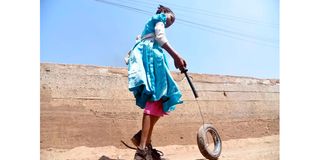Nowhere to run, Nairobi school girls are not safe!

A girl playing in Korogocho slums, Nairobi. A new survey shows that girls are not safe in school, places of worship and in their homes, and need protection.
What you need to know:
- A recent survey by Polycom for Development shows shows that apart from sexual violence, exploitation and harassment, girls also face mental health challenges.
- From the 3,021 notes collected in the survey, 19 per cent (564) related to sexual harassment and abuse.
- A majority 23 per cent (132) reported experiencing indecent touching.
How safe are our girls in their homes, public spaces and places of worship?
That was the big question in a recent survey by Polycom for Development, a Nairobi-based NGO.
The answers were unfortunate; our girls are not safe in school, places of worship and in their homes, and need protection against some of their teachers, caregivers, priests, parents, caregivers, siblings and house helps.
Head of Polycom Jane Anyango, said the survey, that assessed more than 3,000 girls in Nairobi County, also shows that apart from sexual violence, exploitation and harassment, the girls also face mental health challenges.
The official was addressing 10 Nairobi County Assembly members and guests at the launch of the survey report at a Nairobi hotel, last week.
Talking boxes
Polycom Development is a women empowerment and girl-child welfare organisation that operates in Nairobi slums including Mathare, Mukuru, Kiambiu, Kibera and Korogocho, with the support of Womankind World Wide and United Nations Fund for Population Agency (UNFPA).
They also operate in Homa Bay, Kisumu and Mombasa counties through Talking boxes, an initiative started in 2011.
The initiative focuses on engagement and mentorship. The mentors have been collecting and addressing concerns raised by girls in more than 70,000 notes (placed in the boxes) in 20 member schools.
They emphasise on confidentiality, protection of identity and dignity, safeguard personal information, data quality, and must get the girls’ consent.
From the 3,021 notes collected in the survey, 19 per cent (564) related to sexual harassment and abuse.
The girls were asked: Are you safe at home, schools or at the bus stage? A majority 23 per cent (132) reported experiencing indecent touching. The perpetrators included fathers, uncles, teachers, matatu touts and classmates.
Rape cases
Twenty two per cent (122) of the girls reported rape cases, while incest was reported by four per cent (21). Perpetrators included neighbours, boys, friends, fathers, stepfathers and even grandfathers.
In one of the notes in the talking boxes, a girl wrote: “When I have been raped and the man tells me he will kill me, what will I do?”
Other violations captured in the survey included negative comments, which was reported by 11 per cent (60), catcalling eight per cent (45) with boys and teachers as perpetrators.

Children from Kibra slums mark the International Day of The girl Child 2021 in Nairobi, on October 11, 2021. It was organised by Polycom, the NGO that carried out the study.
Stalking was reported by 10 per cent (55) girls with boys and shop keepers as the main perpetrators.
One girl wrote: “There is a man who follows me when I walk back home from school.”
The survey also shows that cases of sexual invites were reported by nine per cent (50) of the girls. Common perpetrators were reported as men, shopkeepers and boys.
Mentorship
Said another schoolgirl: “There is a teacher who calls girls to his house and gives them money and later tells them that he loves them.”
Cases of boys staring and ogling were also reported by five per cent (28) of the girls, while three per cent (17) girls reported that men and boys take their pictures without their consent.
The survey identifies mentorship, equipping girls to identify and report sexual violation cases, and training gate-keepers to be linked to strategic apparatus, as part of interventions.
“We now have evidence to present to the legislators to back the Sexual Offences Amendment Bill; we are seeking justice for the survivor as well. We are calling on the legislators to help us stop the harassment and sexual violations of our girls by all means,” noted Ms Anyango.
The forum was also addressed by WomanKind Worldwide’s Dinah Musindarwezo and MCA Mary Aribize who read a petition they have tabled in the August House to have a safe house built in all the 17 sub-counties of Nairobi for gender-based violence victims and survivors.
Sexual offences
The survey comes a year after Parliament threw out the Sexual Offences Amendment Bill, which was meant to strengthen the original Bill, on grounds that it lacked evidence to back prosecution of perpetrators and suspects.
The Bill read in part: “An Act of Parliament to amend the Sexual Offences Act, 2006 to provide for the manner of collection, analysis, tracking and access to forensic evidence relating to sexual assault and for connected purposes.”
The Sexual Offences Act was moved and passed in 2006 by the then Nominated MP, Njoki Ndung’u. The amendments were to fill the gaps perpetrators and other stakeholders misuse at the expense of the survivors.
But all is not gloom; the survey identifies opportunities including the engagement of parents and other key players in the campaign. Others are the community, media, law makers and enforcers, and civil society.
Ms Anyango was pleased that city MCAs will include the survey findings to beef up their Nairobi City County Sexual and Gender-Based Violence Management and Control Bill, 2019.
“We will continue with our awareness creation, mentorship and empowerment programs,” she said




